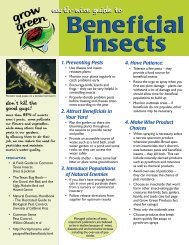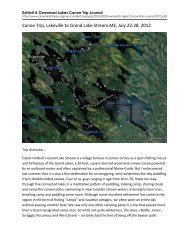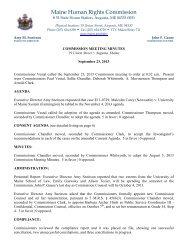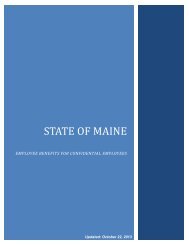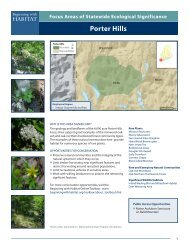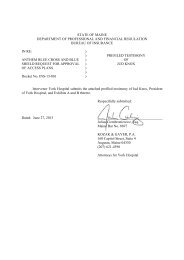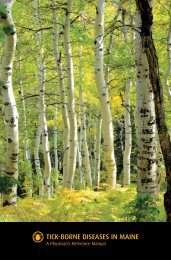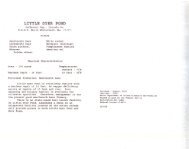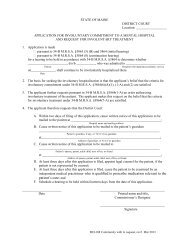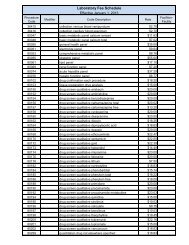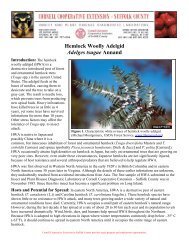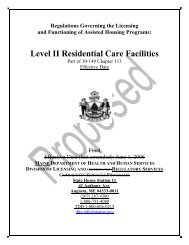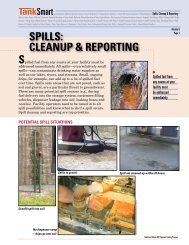294 THE MAINE BUGLE. few rods ahead tempted me to it, and I let myself rest against its trunk. <strong>The</strong> ambu- lance train was in sight and soon the doctor was probing the wound, a bandage was put on the arm wet with cold water, and I was crowded between two comrades who were suffering intensely. By consent of the driver I took a seat with him, and thus made more room for my comrades. This seat gave me, boys, the first real view of a grand contest— three bayonet charges in an open field and a contest occupying about two hours of time. <strong>The</strong> last charge came near dark. I was thinking I might have to stay there, but God was on our side and that night we were taken from what the boys called the bull pen. Oh, how well do I remember the groans of those two comrades inside as we were driven over those rough roads all night. I want to thank the com- rade who came to me during the afternoon, while in the ambulance, with my overcoat. I cannot recall his name, but if he is alive and sees this letter let him accept my hearty thanks. It did me so much good that chilly night, when the cold winds blew with painful sensation on my body, weakened by the loss of so much warm blood. <strong>The</strong> morning of the twenty-eighth found us in a long open field, where I wailed my turn through the whole tiay to have, as I desired then, my arm amputated. Help among doctors was not plenty and they did not reach me that day. <strong>The</strong> next day we were loaded on an old freight train and forwarded to the hospital. Comrades of the army, you all well know about what that meant to me when I tell you I was there eight long months before I was considered able to go home ! I want to close this letter by say- ing that many of us who are now living can but think that it is due largely to the will of God, who may have some little work yet for the old gray-haired veterans to do, if nothing more than speaking a kind word by way of cheer to those more unfortunate than ourselves. Edward Trenchard, of New York, writes: Tn the issue of the <strong>Maine</strong> Bugle of <strong>Jan</strong>uary, <strong>1894</strong>, appears a poem entitled "An Old Blue Cap," by Kendall Pollard of Company K. Now this pt)em, the true title being "Company K " was written during the early part of the rebellion, 1862 or '63, by Mrs. E. L. Beers; the well known poetess, Ethel Lynn, being her nom de plume. At that time the boys in l)luc of <strong>Maine</strong> were too l)usy in the field of reality to indulge in poetic fancy, and I am sure you and your gallant comrades will in justice to one of the fair sex, (departed this life). be pleased to make this correction in your valuable journal. <strong>The</strong> original and only is to be found on page twenty in the volume "All Quiet Along the Pnti-mac " and other poems, by Ethel Lynn Beers, ? rter & Ctates, Publishers, Philadelphia. Note. — <strong>The</strong> correctivn is made with the consent of Kendall P. Hard. It was a misunderstanding on the part of the edit
Lawyers' Loyal League. AN ASSOCIATIOX FOR THE COLI.ECTION OF DEBTS AND INTER- CHANGE OF LEGAL BUSINESS. Fur terms of admission, fees ami charges, address Cilley «.K; MacAllislcr, Managers, Rockland, <strong>Maine</strong>. Auburn, Andri ;uin I'nlsifcr. James A Ashland. Aroostook Augusta. Kennebec Alfred, York Anson, Somerset Athens, Somerset Bangor, Penobscot Bath, Sagadahoc Belfast, Waldo Bethel, Oxford Biddeford, Y'ork Bingham, Somerset Blaine. Aroostook Dunn, Fred (t lilanelianl, II F DoiKivan, .Toliii 1! Ailanis, lU'uiamin Holman, .T F Mitchell, H L Hughes, George E Brown, F W H^rrick, A E (Joiild, .Jesse .Jordan, AVilliam 15 SalVord, H W Boothliay Ilarlior, I.iueoln Kenniston, (i 15 Bluehill, Hancock Bunker. .J E, .Ir Bcjwdoinhaui, Sagadahoc Bogers. (Trant Bradford, Penobscot 'NVentworth, Tlios H Brewer, I'enobscot Hutchins, .Jasjier Bridgeton, Cumberland Walker, AH&EC Browntield, Oxforil Frink J I- Brunswick, ('und)erland Potter, Barrett Buckfield, Oxford Bridgham, Thos S Bucksi)ort, Hancock Fellows, O F Buxton. York Blancliard, J*iscatar Cherryheld. Washington Caui]diel!. F I China, Kennebec (ireeley, ,) H Clinton. Kennebec Martin. Forest J Corinna. Penobscot Wood, W I Corinth, J^ast, Penobscot Haynes. Htuirv P Cornish, York Perliius. Walter P Cauiden, Knox Calais. Washingt(ui Canaan, Somerset Canton. Oxford Caribou, Aroostook Casco, Cumberland Pamariscotta, Lincoln Panforth, Washington Deer Jsle, Hancock Denmark, Oxford Dexter, Penobscot Dixfield, Oxford Dover, Piscata(iuis East Livermore, Audro; Eastport, AVashingtoii Eden. Hancock Eddington, Penobscot Ellsworth, Hancock Hilton, Wm H Hewcs, B W Si>olTord. Elmer P Da\ is, S G Crosbv & Crosbv Trask. .J K Peaks, Jos B coggin Whittemore, H C ;\IcEarren, 1 (! Peters, ,lohn A, Jr Burnham, J A Farnnngton, Franklin Belcher, S (r Fairfield, Simierset Wi-eks, George G Falmouth, AVest, Cumberland Clitford, C E Farniingdale, Kennebec Stillpheu, A C Fort Fairfield, Aroostook Powers, Herbert T Fort Kent, Aroostook Keegan, F W Foxcroft, I'iscataquis Parsons, W E Freedom. AValdo Keen, O H Freeport, Cund)crlaml Mitchell, E W Fryeburg, Oxford Fife, Seth W Gardiner, Kennebec Clason, O B Gorhani, ("umberland AVaterman, John A, Jr Gonldsborough, Winter Harbor, Hancock Tracy, Bedford E Guilford, Piscataquis Hudson, Henry Gray, Cumberland A^inton, AA"" H Hallowell, Kennebec Hamiiden. Penobscot Hanover, Oxford Harrison, Cumberland Hartland. Somerset Hersey, Aroostook Hiram, Oxford HoUis, York .Alayo, H AV Putnam, Sohm A Warren, Jesse W Thompson, D E Smith, B L I'ike, J F Bradbury, H K Houlton, Aroostook Burleigh, Parker C .Jay, Franklin Kennebunk, A'ork Kingman, Penobscot Kittery, A'ork Thompson, Roscoe H Haley, A E Estes, jcre E Safford, Moses A I^eban(ui, A"ork .Jones, S W lA^wiston, Androscogf iggin Knowlton, A K P I^ewiston. Androscog; iggin Drew, FM I>il.crty, Waldo Knowlton, J W Limerick, Y'ork lliggins, Frank M Limington, Y'ork McArthnr, AVilliam M Lincoln, Penobscot Clark, Hugo Lisbon, Androscoggin Coolidge. H E I>ovell. Oxford " Hobbs, J F I^ubec, AVashington Gray, James H Machias, AVashington AIcFaul, A D ^Madison, Somerset Small, C O Manchester, Kennebec Farr, Loring >techanic Falls, Androscoggin Purrington, F O Mercer, Somerset Croswell, H T Mexico, Oxford Trask. John R :\Ullbridge, Washington Gray, H H Milo, Piscataquis Durgin, M L In corresjiondiug with these attorneys please mention that you found their names here.
- Page 7 and 8:
THE MAINE BUGLE. Entered at the Po$
- Page 9 and 10:
Losses in the First Maine Heavy Art
- Page 11 and 12:
CHARGE OF THE HEAVY ARTILLERY. 5 pe
- Page 13 and 14:
CHARGE OF THE HEAVY ARTILLERY. 7 fi
- Page 15 and 16:
LOSSES OF THE HEAVY ARTILLERY. 9 Co
- Page 17 and 18:
LOSSES OF THE HEAVY ARTILLERY. \\ N
- Page 19 and 20:
LOSSES OF THE HEAVY ARTILLERY. 13 L
- Page 21 and 22:
LOSSES OF THE HEAVY ARTILLERY. 15 h
- Page 23 and 24:
LOSSES OF THE HEAVY ARTILLERY. 17 C
- Page 25 and 26:
AN OLD BLUE CAP. 19 S mining up the
- Page 27 and 28:
Gen. Humphrey writes : SIDE LIGHTS.
- Page 30 and 31:
Dr. HENRY C. LEVENSALER, Surgeon 8t
- Page 32 and 33:
24 THE MAINE BUGLE. of day. While m
- Page 34 and 35:
26 THE MAINE BUGLE. building fortif
- Page 36:
28 THE MAINE BUGLE. Again we hear t
- Page 39 and 40:
A MAN FROM MAINE. 29 Let proud Virg
- Page 41 and 42:
.4 MAN FROM MAINE. 81 which was an
- Page 43 and 44:
A MAN FROM MAINE. 33 Butler request
- Page 45 and 46:
A MAN FROM MAINE. 35 to success. He
- Page 47 and 48:
A MAN FROM MAINE. 37 by the ablest
- Page 49 and 50:
A MAN FROM MAINE. 39 The sea-face f
- Page 51 and 52:
A MAN FROM MAINE. 41 The outbreak o
- Page 53 and 54:
A MAN FROM MAINE. 43 threw themselv
- Page 55 and 56:
A MAN FROM MAINE. 45 too small fron
- Page 57 and 58:
A MAti FROM MAINE. 47 Keeping close
- Page 59 and 60:
A MAN FROM MAINE. 49 fort, and cons
- Page 61 and 62:
:.:.rsy : .•: Scale ofPUiit- 32gr
- Page 63 and 64:
A MAN FROM MAINE. 53 one time killi
- Page 65 and 66:
A MAN FROM MAINE. 65 the fleet to c
- Page 67 and 68:
A MAN FROM MAINE. 57 movement of Ab
- Page 69 and 70:
A MAN FROM MAINE. 69 blankets just
- Page 71 and 72:
A MAN FROM MAINE. 61 All honor to t
- Page 73 and 74:
A MAN FROM MAINE. 63 " Their respec
- Page 75 and 76:
A MAN FROM MAINE. 65 uary i6, by Ma
- Page 77 and 78:
A MAN FROM MAINE. 67 New Inlet. The
- Page 79 and 80:
A MAN FROM MAINE. 69 He fell a shor
- Page 81 and 82:
A CAVALRYMAN IN THE ELEVENTH MAINE.
- Page 83 and 84:
A CAVALRYMAN IN THE ELEVENTH MAINE.
- Page 85 and 86:
A CAVALRYMAN IN THE ELEVENTH MAINE.
- Page 87 and 88:
THE ELEVENTH MAINE AT APPOMATTOX. 7
- Page 89 and 90:
THE ELEVENTH MAINE AT APPOMATTOX. 7
- Page 91:
Dr. HORACE C. WHITE, Asst. Surgeon
- Page 94 and 95:
82 THE MAINE BUGLE. from heaven to
- Page 96 and 97:
84 THE MAINE BUGLE. January 4th, 18
- Page 98 and 99:
86 THE MAINE BUGLE. work for the pr
- Page 100 and 101:
88 THE MAINE BUGLE. of the place. W
- Page 103 and 104:
BUGLE ECHOES. 89 of their State, wi
- Page 105 and 106:
BUGLE ECHOES. 91 Co. L, First Maine
- Page 107 and 108:
BUGLE ECHOES. 93 Milwaukee, which r
- Page 109 and 110:
BUGLE ECHOES. 95 makes one feel ver
- Page 111 and 112:
BUGLE ECHOES. 97 DOWN IN TENNESSEE.
- Page 113 and 114:
BUGLE ECHOES. 99 fifteen years ago.
- Page 116 and 117:
EDWARD A. TRUE, Lieutenant Colonel
- Page 118 and 119:
Save Money.— Regular Subscribers
- Page 120 and 121:
106 THE MAINE BUGLE. ling of musket
- Page 122 and 123:
108 THE MAINE BUGLE. to him, have t
- Page 124 and 125:
110 THE MAINE BUGLE. March ! " and
- Page 126 and 127:
112 THE MAINE BUGLE. Lynch, a simpl
- Page 128 and 129:
114 THE MAINE BUGLE. tell you we we
- Page 130 and 131:
116 THE MAINE BUGLE. Much of this h
- Page 132 and 133:
118 THE MAINE BUGLE. my labor and i
- Page 135 and 136:
PETERSBURG TO APPOMATTOX. 119 for o
- Page 137 and 138:
PETERSBURG TO APPOMATTOX. 121 human
- Page 139 and 140:
A REVIEW OF ALDIE. 123 heart went o
- Page 141 and 142:
A REVIEW OF ALDIE. 125 men. I first
- Page 143 and 144:
A HE VIE IV OF ALDIE. 127 surprise,
- Page 145 and 146:
A HE VIE IV OF ALDIE. 129 The follo
- Page 147 and 148:
A REVIEW OF ALDIE. 181 culties that
- Page 149 and 150:
RECOLLECTIONS Of APPOMATTOX. 133 So
- Page 151 and 152:
RECOLLECTIONS OF APPOMATTOX. 135 th
- Page 153 and 154:
RECOLLECTIONS OF APPOMATTOX. 137 op
- Page 155 and 156:
RECOLLECTIONS OF APPOMATTOX. 139 I.
- Page 157 and 158:
THE TWENTIETH MAINE. 141 And so for
- Page 159 and 160:
CORRECTIONS AND ADDITIONS. 143 Corr
- Page 161 and 162:
CORRECTIONS AND ADDITIONS. 145 Co.
- Page 163 and 164:
FIFTH NEW YORK IN THE VALIEY. 147 1
- Page 165 and 166:
FIFTH NEW YORK IN THE VALIEY. 149 S
- Page 167 and 168:
FfF'lII NEW YORK IN THE VALLEY 151
- Page 169 and 170:
FIFTH NEW YORK IN THE VALLEY. 153 t
- Page 171 and 172:
FIFTH NEW YORK IN THE VAILEY. 155 r
- Page 173 and 174:
FIFTH NEW YORK' IN THE VALLEY. 157
- Page 175 and 176:
FIFTH NEW YORK' IN THE VALLEY. 159
- Page 177 and 178:
MASSACHUSETTS BRANCH ASSOCIATION. I
- Page 180 and 181:
COL. FRANK C. KNIGHT, Mayor of Rock
- Page 182 and 183:
1(34 THE MAINE BUG I.E. Banquet of
- Page 184 and 185:
166 Tf^P' MAINE BUGLE. thankctl Cio
- Page 186 and 187:
168 THE MAINE BUGLE. Walter V. Hans
- Page 189 and 190:
HISTORY OF THE TWELFTH MAINE INFANT
- Page 191 and 192:
HISTORY OF THE TWELFTH MAINE INFANT
- Page 193 and 194:
HISTORY OF THE TWELFTH MAINE INFANT
- Page 195 and 196:
BY GtN. J. REGIMENTAL IIISTORfES. 1
- Page 197 and 198:
- ' REGIMENTAL HISTORIES. 177 Ninet
- Page 199 and 200:
MIJJTARY INSTKbCTION IN SCHOOLS. 17
- Page 201 and 202:
MILITARY INSTRUCTION IN SCHOOLS. 18
- Page 203 and 204:
TAPS. 183 Taps. All lights out. Dr.
- Page 205 and 206:
TAPS. 185 DR. JOHN P. SHEAHAN. All
- Page 207 and 208:
BUGLE ECHOES. 187 Bugle Echoes. Sou
- Page 209 and 210:
BUGLE ECHOES. 189 my own experience
- Page 211 and 212:
BUGLE ECHOES. 191 one when publishe
- Page 213 and 214:
BUGLE ECHOES. 193 soon they had ord
- Page 215 and 216:
BUGLE ECHOES. 195 for food fur \vc
- Page 217 and 218:
BUGLE ECHOES. 197 (luring my stay a
- Page 219 and 220:
N Lawyers' Loyal Legion. A\ ASSOCIA
- Page 222 and 223:
Maiok (",i;m:kai, ()i,i\i;k O. Howa
- Page 224 and 225:
Save Money. — Regular Subscribers
- Page 226 and 227:
202 THE MAINE BUGLE. one of the sta
- Page 228 and 229:
204 THE MAINE BUGLE. turned back fr
- Page 230 and 231:
206 THE MAINE BUGLE. " Longing for
- Page 232 and 233:
208 THE MAINE BUGLE. followed Stonc
- Page 234 and 235:
210 THE MAINE BUGLE. found himself
- Page 236 and 237:
212 THE MAINE BUGLE. did ail anion
- Page 238 and 239:
214 THE MAINE BUGLE. Reminiscences
- Page 240 and 241:
216 THE MAINE BUGLE. were found gui
- Page 242 and 243:
218 THE MAINE BUGLE. that means, bu
- Page 244 and 245:
220 THE MAIf^E BUGLE. up with his h
- Page 246 and 247:
222 THE MAINE BUGLE. worth savin'."
- Page 248 and 249:
2-24 THE MAINE BUGLE. over there, a
- Page 250 and 251:
226 THE MAINE BUGLE. be captured fr
- Page 252 and 253:
228 THE MAINE BUGLE. to make i\ dea
- Page 254 and 255:
230 THE MAINE BUGLE. at the time tl
- Page 256 and 257:
232 THE MAINE BUGLE. have rode tlir
- Page 258 and 259:
2;J4 THE MAINE BUGLE. mond, which t
- Page 260 and 261:
236 THE MAINE BUGLE. much when an o
- Page 262 and 263:
238 THE MAINE BUGLE. though he had
- Page 264 and 265:
240 THE MAINE BUGLE. dared. This kn
- Page 266 and 267:
242 THE MAINE BUGLE. The column mov
- Page 268 and 269:
244 THE MAINE BUG I.E. while he iiu
- Page 270 and 271:
246 THE MAINE BUGLE. My coniradcs w
- Page 272 and 273:
248 THE MAINE BUGLE. began to waver
- Page 274 and 275: 250 THE MAINE BUGLE. " bristled wit
- Page 276 and 277: 262 "t^nk Maine bUgLK. A signal sta
- Page 278 and 279: 254 ^^^^ MAINE BVGLt. lines were we
- Page 280 and 281: 25G THE MAINE BUGLE. " Stand linn,
- Page 282 and 283: 258 T^fP- MAINE BUGLE. (italics min
- Page 284 and 285: 260 TlfP- MAINE BUGLE. would have n
- Page 286 and 287: 262 77/i5: MAINE BUGLE. reinforced
- Page 288 and 289: 264 THE MAINE BUGLE. Bartlclt, Will
- Page 290 and 291: 266 THE MAINE BUGLE. Staples, Wentw
- Page 292 and 293: 268 THE MAINE BUGLE. Secretary Grib
- Page 294: 270 THE MAINE BUGLE. their commande
- Page 297 and 298: THE CAVALRY SOCIETY Armies of the U
- Page 299 and 300: OFFICERS OF THE SOCIETY. 273 Office
- Page 301: General Jonathan P. Cilley.
- Page 304 and 305: 276 THE MAINE BUGLE. Adjutant Gener
- Page 306 and 307: 278 'THE MAINE BUGLE. you go in the
- Page 309 and 310: MINOR INCIDENTS OF THE REUNION. 279
- Page 311 and 312: IN MEMORIAM. ' 281 first lieutenant
- Page 313 and 314: IN MEMOKIAM. 283 trooper, yet with
- Page 315 and 316: BUGLE ECHOES. 285 Bugle Echoes, Thj
- Page 317 and 318: BUGLE ECHOES. 287 6th, we were orde
- Page 319 and 320: BUGLE ECHOES. 289 I LOVE HER HILLS.
- Page 321 and 322: BUGLE ECHOES. 291 comprised about h
- Page 323: BUGLE ECHOES. 293 it as one of the
- Page 327 and 328: THE MAINE BUGLE. Entered at the Pos
- Page 329 and 330: With Sheridan in Lee's Last Campaig
- Page 331 and 332: WITH GENERAL SHERIDAN. 299 passed o
- Page 333 and 334: WITH GENERAL SHERIDAN. 301 curiosit
- Page 335 and 336: WITH GENERAL SHERIDAN. 303 quarters
- Page 337 and 338: WITH GENERAL SHERIDAN. 305 owing to
- Page 339 and 340: WITH GENERAL SHERIDAN. 307 To the r
- Page 341 and 342: WITH GENERAL SHERIDAN. 309 after th
- Page 343 and 344: WITH GENERAL SHERIDAN. 311 General
- Page 345 and 346: WITH GENERAL SHERIDAN. 313 we did n
- Page 347 and 348: WITH GENERAL SHERIDAN. 315 cared fo
- Page 349 and 350: PRISON LIFE AND ESCAPE. 317 which w
- Page 351 and 352: PRISON LIFE AND ESCAPE. 319 cheer f
- Page 353 and 354: PRISON LIFE AND ESCAPE. 321 warm un
- Page 355 and 356: PRISON LIFE AND ESCAPE. 323 ber, 18
- Page 357 and 358: PRISON LIFE AND ESCAPE. 325 time to
- Page 359 and 360: PRISON LIFE AND ESCAPE. 327 part an
- Page 361 and 362: PRISON LIFE AND ESCAPE. 329 hardly
- Page 363 and 364: PRISON LIFE AND ESCAPE. 331 driver
- Page 365 and 366: REUNION OF THE FIRST MAINE CAVAIRY.
- Page 367 and 368: REUNION OF THE FIRST MAINE CAVALRY.
- Page 369 and 370: REUNION OF THE FIRST MAINE CAVALRY.
- Page 371 and 372: REUNION OF THE FIRST MAINE CAVALRY.
- Page 373 and 374: REUNION- OF THE FIRST MAINE CAVALRY
- Page 375 and 376:
THE SECOND MAINE CAVALRY REUNION. 3
- Page 377 and 378:
iSbs—SEPTEMBER ig—i8g4. 345 ago
- Page 379 and 380:
FOURTH INFANTRY AND SECOND BATTERY.
- Page 381 and 382:
FOURTH IFANTRV AMD SECOND BATTERY.
- Page 383 and 384:
FOURTH INFANTRY AND SECOND BATTERY.
- Page 385 and 386:
KNOX AND LINCOLN VETERANS. 353 of t
- Page 387 and 388:
KNOX AND LINCOLN VETERANS. 355 in b
- Page 389 and 390:
REUNION OF THE FIFTH MAINE INFANTRY
- Page 391 and 392:
THE SIXTH AND NINTH MAINE. 359 gave
- Page 393 and 394:
THE SIXTH AND NINTH MAINE. 361 subj
- Page 395 and 396:
THE SEVENTH MAINE. 363 late George
- Page 397 and 398:
THE EIGHTH MAINE. 365 A president o
- Page 399 and 400:
THE EIGHTH MAINE. 367 done in Massa
- Page 401 and 402:
THE EIGHTH MAINE. 369 McArthur, of
- Page 403 and 404:
FIRST, TENTH AND TWENTY-NINTH INFAN
- Page 405 and 406:
FIRST, TENTH AND TWENTY-NINTH INFAN
- Page 407 and 408:
IN MEMORIAM. 375 In Memoriam. ALEXA
- Page 409 and 410:
IN MEMORIAM. 377 JONATHAN P. CILLEY
- Page 411 and 412:
IN MEMORIAM. 379 friends. The Y. M.
- Page 413 and 414:
BUGLE ECHOES. 381 Bugle Echoes. " T
- Page 415 and 416:
BUGLE ECHOES. 383 DEATH IN ANDERSON
- Page 417 and 418:
BUGLE ECHOES, 385 but space forbids
- Page 419 and 420:
BUGLE ECHOES. 387 trying to keep co
- Page 421 and 422:
ECHOES, CONTENTS OF CAMPAIGN I. 389
- Page 423 and 424:
CONTENTS OF CAMPAIGN I. 391 PORTRAI
- Page 425 and 426:
Monmouth, North, Kennebec Jeff rev.
- Page 427 and 428:
i Order Coupon : HARPER'S WAR HISTO
- Page 429 and 430:
'^^^M^^^J^^^^fo^M^^ fllTKm0NT.5I'5Q



